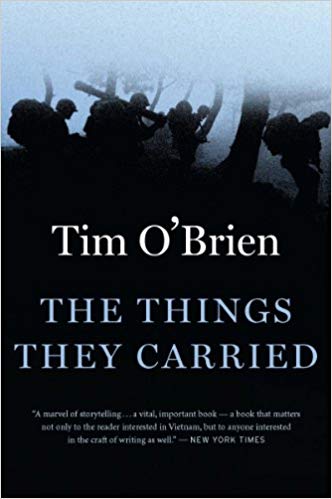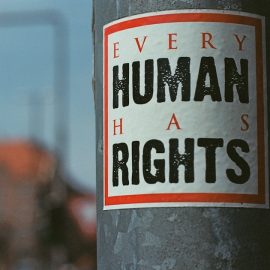

This article is an excerpt from the Shortform summary of "The Things They Carried" by Tim O'Brien. Shortform has the world's best summaries of books you should be reading.
Like this article? Sign up for a free trial here .
What was Tim O’Brien’s Vietnam like? How did Tim O’Brien’s depiction of the Vietnam War in The Things They Carried demonstrate wider themes of the brutality of war and the power of storytelling?
We’ll cover how Tim O’Brien’s Vietnam depicts wider themes of war and discuss the main themes of The Things They Carried.
Tim O’Brien’s Vietnam
The Things They Carried is a collection of interconnected short stories about the experiences of a company of young American men serving in the Vietnam War. The book blurs the line between fiction and autobiography. It is told mainly from the first-person perspective of a middle-aged writer named Tim O’Brien, who is looking back on his time during the war. Tim O’Brien, however, is also the name of the actual author of The Things They Carried—it is unclear if the main character (and narrator) of the book is meant to be the same person as the author (who is also a Vietnam veteran).
The blending of fact and fiction is further developed as O’Brien tells us throughout the book that many of the tales we have read are not literally true. Rather, they are stories whose embellishments and fantastical qualities convey to the reader the full scale of the horror and emotional trauma of war. Because they produce what he deems to be the appropriate emotional reaction in the reader—one of shock, revulsion, and even disbelief—O’Brien deems this collection of stories to be truer than actual truth. Tim O’Brien’s Vietnam stories bring the experience of Vietnam to life in a way that a straight retelling of the facts never could.
The stories of Tim O’Brien’s Vietnam do not form a coherent, linear narrative—we jump back and forth through time and space and between the perspectives of different characters. Sometimes, O’Brien takes us inside the minds of characters other than himself, revealing their deepest thoughts and fears—details that would be impossible to recount, of course, if the book were a simple war autobiography. We see O’Brien’s early experiences with grief and loss as he recounts the death of his childhood girlfriend in the 1950s, his reluctance to go to war when he is drafted, the trauma and chaos he experiences when he is in Vietnam, and his attempts to make peace with his past and achieve closure with the war when he revisits the combat scenes of his youth with his daughter.
But we also see how the other men he serves with process the harrowing experience of war. We see these men engage in shocking acts of cruelty toward Vietnamese soldiers, civilians, each other, and even themselves. We see how the high chance of sudden death makes life a cheap commodity for the soldiers. And we see how the men use the power of storytelling to make sense of the ordeal and burden of war. Telling stories enables them to objectify their experiences, to make them seem more distant, third-party, and remote—and thus, more bearable. But creating a narrative around their experiences also brings the war and the people whom they lost to it back to life. Telling their stories makes them immortal.
The Things They Carried explores some key themes:
The Trauma of War
The men endure harrowing life-and-death experiences fighting in the jungles of Tim O’Brien’s Vietnam. There are, of course, the physical threats to one’s safety, as men become sick, lose limbs in combat, and are even killed. Men die suddenly, randomly, and gruesomely, whether from unexpected bursts of sniper fire, stepping on landmines, or even drowning in sewage fields. But there are also the psychological threats to one’s sanity and basic humanity, as the men of Alpha Company succumb to the emotional traumas inflicted by fear, isolation, and grief.
Brutalization
In Tim O’Brien’s Vietnam, as the men spend more time in Vietnam and become more exposed to life in a war zone, they become hardened and emotionally callous. O’Brien comes to believe that he has lost some essential part of his former self because of the things he has seen and done. The men of Alpha Company burn down villages, terrorize the local Vietnamese population, slaughter animals, and mock the grief of the people they see lamenting the loss of their homes and families. At other times, they desecrate corpses of dead soldiers and civilians—kicking them, cutting off their limbs as trophies, and mockingly “shaking hands” with them.
But they also brutalize and dehumanize with language. The men joke and put on a mask of weary indifference to cope with the threat of death that hangs over their entire existence. When someone dies, they are, “offed,” “lit up,” or “zapped.” Even when some of their own are killed, the reaction is the same—jokes, callous remarks, and outward displays of cold indifference.
Fear of Shame
O’Brien shares an early, pre-Vietnam experience from his childhood, in which he fails to defend a friend who was suffering from a brain tumor from having her cap yanked off in class by a bully, revealing her bald head. He says that he failed to show moral courage and act on his principles because he didn’t want to look weak or effeminate in defending a vulnerable friend. He felt compelled to socially sanction an act of cruelty.
He faces similar dilemmas as a soldier. When first drafted into the war, O’Brien contemplates fleeing to Canada, but also feels immense pressure from his conservative Minnesota hometown to fight, and fears being seen as a coward. While he believes that the war is morally wrong and politically unjustified, he ultimately succumbs to his fear of how he would be perceived by his peers and goes to Vietnam—a decision which he, ironically, looks back on as having been the cowardly one.
Later, in Tim O’Brien’s Vietnam, he sees that the men of Alpha Company disdain outward displays of compassion and celebrate those fellow soldiers who seem to relish the violence of combat. Those who deliberately injure themselves to escape active duty are castigated as dishonorable and shameful “pussies” and “candy-asses.”
The Power of Storytelling
A frequent theme throughout the book is how telling fictionalized narrative stories brings true experiences alive. Tim O’Brien’s Vietnam isn’t necessarily the factual Vietnam, but it conveys the truth better than nonfiction could. O’Brien discusses the difference between happening-truth and story-truth. Happening-truth is just the literal recounting of events that happened, while story-truth is imbued with fictional or exaggerated elements. Story-truth, however, is more real, because its sensationalized features more fully convey to the reader the emotional power of what happened. Stories can be truer than truth.
O’Brien experiments with this theme throughout the book, by relating emotionally traumatic episodes to us (like his killing of a young Vietnamese soldier), only to reveal to us later in the narrative that they did not actually happen the way he told us. Nevertheless, the stories are “true” because they convey to us what it felt like for O’Brien to be in these situations in a way that the literal truth (or happening-truth) never could.
He notes that true war stories aren’t parables—they’re not meant to instruct, impart morals, serve as examples of good conduct, generalize, or engage in abstraction. What makes the story true is the reaction it produces, not the content itself. These are the impact of Tim O’Brien’s Vietnam stories. Thus, something may happen and still be a complete lie, while another thing may be pure fiction and yet truer than the actual truth.
For O’Brien, a writer, storytelling is an act of both catharsis and resurrection. He can process his own war experiences and make sense of them by reshaping them into a narrative. But he can also see the dead again, make them smile and speak. He likens his characters to books on a library shelf that haven’t been checked out for a long time. They are lying dormant, waiting for him to check them out and bring them to life once more—to make them immortal through storytelling.
———End of Preview———

Like what you just read? Read the rest of the world's best summary of "The Things They Carried" at Shortform . Learn the book's critical concepts in 20 minutes or less .
Here's what you'll find in our full The Things They Carried summary :
- What the Vietnam War was like for soldiers on the ground
- How Vietnam soldiers dealth with the psychological stress of death around them
- How fictional stories can be truer than the truth






